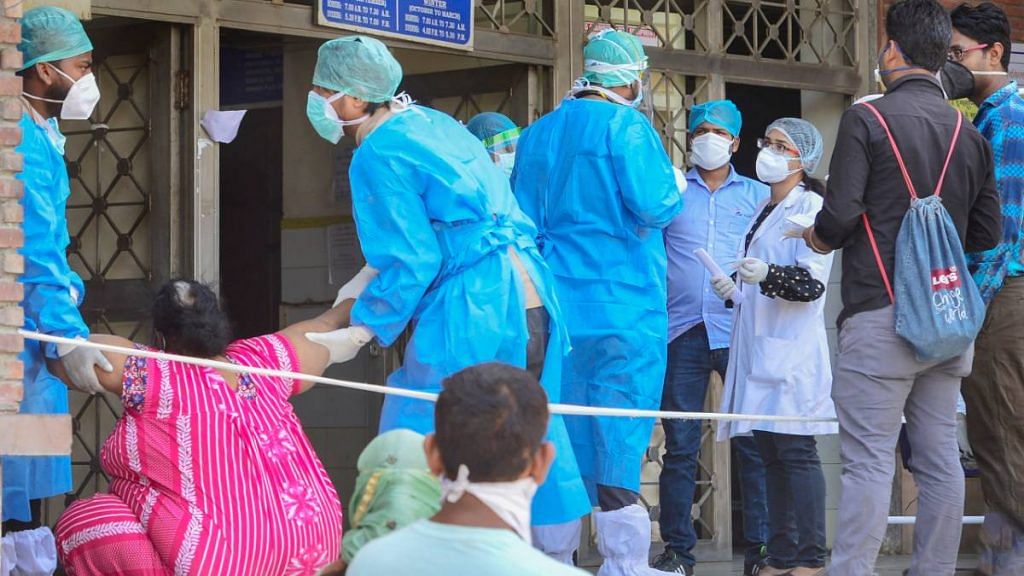New Delhi: Delhi Chief Minister Arvind Kejriwal’s decision to close borders for at least a week so that only local citizens can be treated at hospitals in the national capital has divided doctors and public health experts.
In view of the rising Covid-19 cases, Kejriwal said Monday that Delhi has the best healthcare facilities compared to other states and if the national capital doesn’t seal its borders, people from across the country will pour in to get treatment and the “9,000 beds available here will be occupied within two days”.
Delhi has been averaging 1,200-1,300 cases daily, with a recorded total of 23,645 cases and 606 deaths as of Thursday. The hospital load was at 2,300 patients as of Monday.
The CM’s order came a day after Haryana and Uttar Pradesh also sealed their borders with Delhi. The UP government even blamed Delhi for 40 per cent of Noida’s Covid-19 cases. The state governments were allowed to decide on interstate movement under Centre’s guidelines for Unlock 1.0 in effect from 1 June.
While Kejriwal has said he will take a call on revising the order in place until 8 June, doctors and experts have differing views on the future course of action.
Speaking to ThePrint, some said the move is fair as Delhi hospitals are overburdened, and Covid treatment for symptomatic, asymptomatic and mild and very mild cases can be managed at local level. Others, however, raised questions over the denial of the principle of natural justice, and say the time is ripe for building and expanding the local healthcare system.
Also read: Delhi’s LNJP hospital fears staff shortage ahead of ‘Covid peak’ as 150 doctors get exam leave
‘Delhi hospitals are overburdened’
“As a government hospital we cannot refuse patients but patients should seek healthcare locally. We are already overburdened,” said Dr Ritu Saxena, chief medical officer, Lok Nayak Jai Prakash Narayan Hospital, which is the nodal centre for Covid-19 in Delhi.
‘Can be managed at local level’
“Ideally, Delhi hospitals should be kept open, but local healthcare infrastructure should also be strengthened. We need to create a network of hospital linkages and use telemedicine. Of the Covid patients, only 15 per cent require hospitalisation while 5 per cent need ventilators. Symptomatic, asymptomatic and mild and very mild cases can be managed at the local level. Only severe ones can be shifted in coordination with the hospitals,” said Dr A.M. Kadri, secretary-general at the Indian Association of Preventive Social Medicine.
‘What about follow-up treatment?’
“What about follow-up patients like those who have undergone transplant surgery? Patients are often not comfortable with other doctors for follow-up treatment. What will happen to them? If a Covid patient comes from Rajasthan, for instance, because he feels he will get better treatment in Delhi, and is turned away at the border, that’s crucial recovery time lost. Health system is overburdened but patients cannot be harassed at any cost,” said a senior official at Ganga Ram Hospital.
Also read: Health ministry shuts offices for 2 days, issues guidelines as Covid cases rise among staffers
‘Current caseload doesn’t require this kind of a move’
“How can you stop patients? People come to Delhi because they cannot get this kind of treatment anywhere else. It’s the responsibility of the central and the state governments to create facilities if they feel they cannot cope with the caseload. The current caseload does not require this kind of a move,” said Dr Sanjay Rai, professor, Centre for Community Medicine, All India Institute of Medical Science, and Indian Public Health Association president.
‘Expand services’
“Hospitals need to be open for all. All large hospitals, which attract patients from all over the country, have the capacity and expertise to expand services. Delhi can easily enroll more private hospitals and more hotels. This way they can make hospitals accessible for all,” said Dr Preeti Kumar, vice-president, health systems support, Public Health Foundation of India.
‘People bear the burden rather than governments’
“There has to be very good secondary healthcare at least within each district. In India because some states invest in healthcare and livelihood generation there is an influx from other states. This naturally burdens the host state. States should pay for healthcare to host states as a proportion of people who are employed there. So Uttar Pradesh will have to pay Karnataka for free healthcare based on the proportion of people from UP employed in the formal and informal sector in Karnataka. Unfortunately, the burden is often borne by the people rather than the governments,” said Sylvia Karpagam, a community medicine specialist.
Also read: Masks, temperature checks & long wait outside hospitals — Ahmedabad limping back to normal
